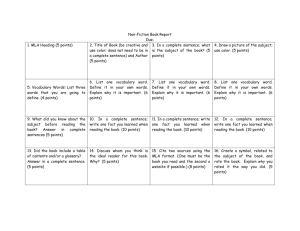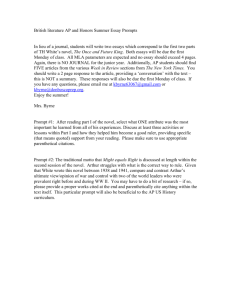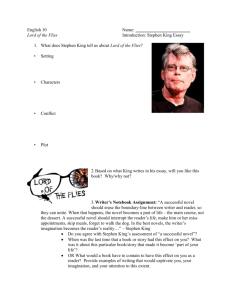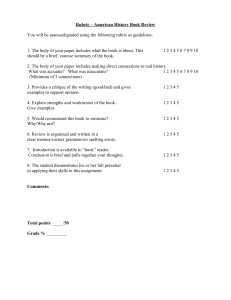English 11 Language and Composition AP Pajak/Schubert
advertisement
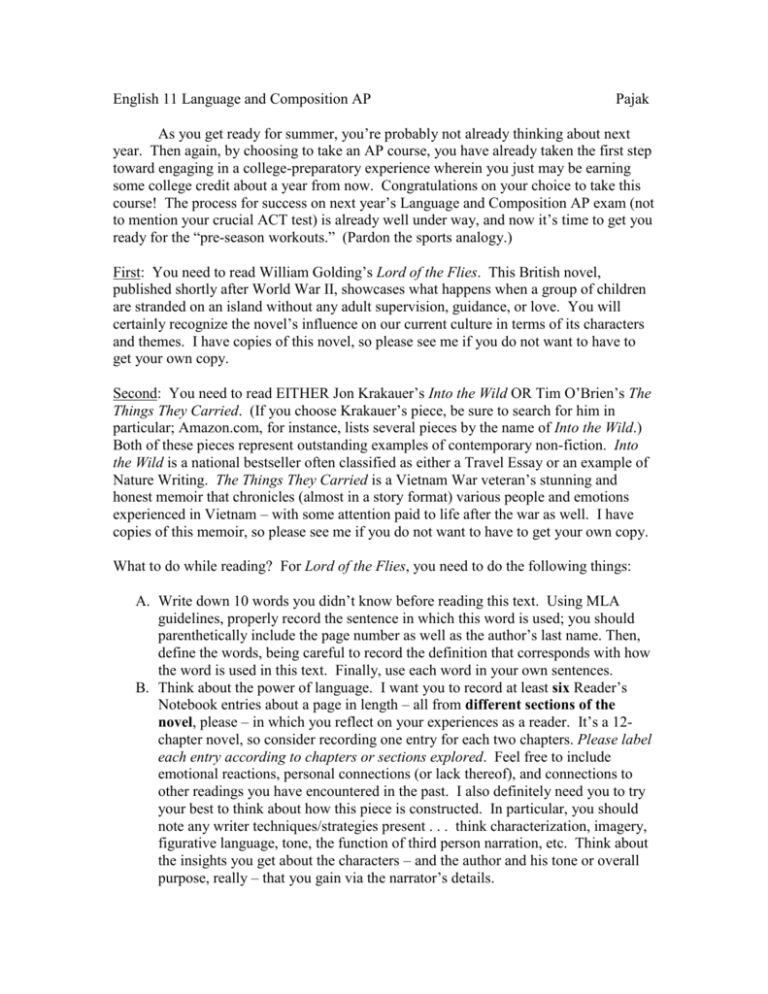
English 11 Language and Composition AP Pajak As you get ready for summer, you’re probably not already thinking about next year. Then again, by choosing to take an AP course, you have already taken the first step toward engaging in a college-preparatory experience wherein you just may be earning some college credit about a year from now. Congratulations on your choice to take this course! The process for success on next year’s Language and Composition AP exam (not to mention your crucial ACT test) is already well under way, and now it’s time to get you ready for the “pre-season workouts.” (Pardon the sports analogy.) First: You need to read William Golding’s Lord of the Flies. This British novel, published shortly after World War II, showcases what happens when a group of children are stranded on an island without any adult supervision, guidance, or love. You will certainly recognize the novel’s influence on our current culture in terms of its characters and themes. I have copies of this novel, so please see me if you do not want to have to get your own copy. Second: You need to read EITHER Jon Krakauer’s Into the Wild OR Tim O’Brien’s The Things They Carried. (If you choose Krakauer’s piece, be sure to search for him in particular; Amazon.com, for instance, lists several pieces by the name of Into the Wild.) Both of these pieces represent outstanding examples of contemporary non-fiction. Into the Wild is a national bestseller often classified as either a Travel Essay or an example of Nature Writing. The Things They Carried is a Vietnam War veteran’s stunning and honest memoir that chronicles (almost in a story format) various people and emotions experienced in Vietnam – with some attention paid to life after the war as well. I have copies of this memoir, so please see me if you do not want to have to get your own copy. What to do while reading? For Lord of the Flies, you need to do the following things: A. Write down 10 words you didn’t know before reading this text. Using MLA guidelines, properly record the sentence in which this word is used; you should parenthetically include the page number as well as the author’s last name. Then, define the words, being careful to record the definition that corresponds with how the word is used in this text. Finally, use each word in your own sentences. B. Think about the power of language. I want you to record at least six Reader’s Notebook entries about a page in length – all from different sections of the novel, please – in which you reflect on your experiences as a reader. It’s a 12chapter novel, so consider recording one entry for each two chapters. Please label each entry according to chapters or sections explored. Feel free to include emotional reactions, personal connections (or lack thereof), and connections to other readings you have encountered in the past. I also definitely need you to try your best to think about how this piece is constructed. In particular, you should note any writer techniques/strategies present . . . think characterization, imagery, figurative language, tone, the function of third person narration, etc. Think about the insights you get about the characters – and the author and his tone or overall purpose, really – that you gain via the narrator’s details. For the non-fiction piece, you need to do the following things: A. Write down 10 words you didn’t know before reading this text. Using MLA guidelines, properly record the sentence in which this word is used; you should parenthetically include the page number as well as the author’s last name. Then, define the words, being careful to record the definition that corresponds with how the word is used in this text. Finally, use each word in your own sentences. B. Again, you should think about the power of language. Here, you should again construct at least six Reader’s Notebook entries in which you reflect on what you read. These should (again) be spread out from different sections in the work; at the top of each entry, record which chapters or sections you will discuss. Again, you need to be thinking about how the author works to get you thinking and feeling a certain way. Ask yourself what this author does to get you feeling sorrow, intrigue, ambivalence, etc. Record specific passages and quotes; discuss whatever you feel comfortable with at this point. Discuss individual words and their connotations, patterns with sentences/paragraphs, how the author appears to feel about that which he/she discusses, etc. There will also be a test on both pieces at the end of the first week we return from school. Your Reader’s Notebooks with vocabulary will also be due at that time. Have a great summer; if you are as excited about next year as I am, then you will enjoy yourself so much that all your work might not even feel that much like work after all. Well, you will have at least a little fun . Besides, any/all work you will do will be assigned with your instructor’s absolutely best intentions in mind. You might work hard, but I will work even harder on your behalf. The AP program is designed to be commensurate with a college-level experience, and it is with great pride and honor that I teach you. See you soon! Mr. Pajak
